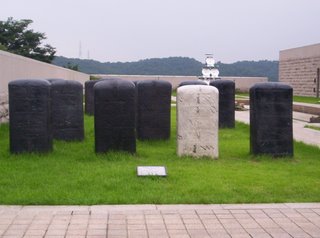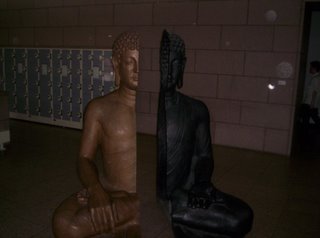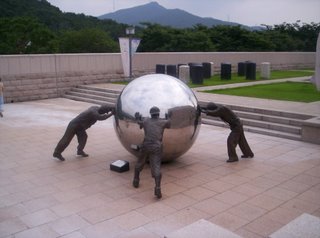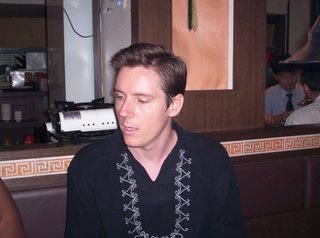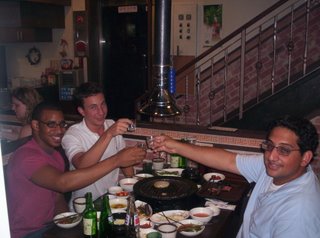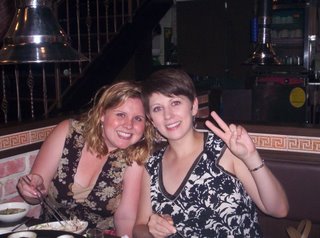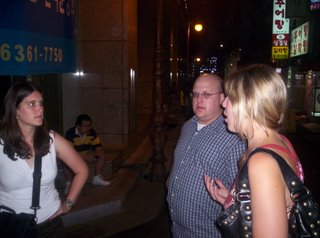Speech delivered at the 6th Annual Wyoming Forensics Institute, July 18, 2006I have given this speech the rather unoriginal and derivative title “Deliberation or Barbarism.” For many years various people in the debate community have used slogans such as “replacing weapons with words” and “violence begins when conversations end.” I propose tonight that we begin to take those slogans seriously. I believe that competitive debate serves a deliberative purpose, and that fostering a general commitment to rule-based deliberation is essential to our survival—whether our threats are apocalyptic or more nuanced. I don’t know if our species will be “wiped out” if we don’t start listening to each other, but I do believe that such listening, accompanied by a commitment to answering each other’s arguments, is a check against the barbarism and brutishness of those who profit from our failure to debate. And it isn’t hard to foresee a descent into complete barbarism, as competing factions abandon dialogue and submit to the lure of isolation and paranoia, interrupted by encounters based on degradation and abuse.
Over the past week we have been hearing tragic news about the conflict in the Middle East. Any armed conflict is tragic, but the antecedents of this current explosion have been brewing for a long time and they strike me as particularly tragic because of their impact on children. On one side, you have a movement of people striving for liberation, self-determination, and living space, but their leaders encourage them to strap bombs to their bodies—in some cases very young bodies—in order to go into public places and explode, taking countless others with them—including more children.
On the other side,
you have a nation retaliating against these attacks by bombing particular targets, but because those targets are placed among civilians, more innocent people die, including more
children. Ironically,
many statistics suggest that these “extraneous” deaths of children outnumber the underage victims of suicide bombings.
If you have ever been a parent (and I know there are a couple of parents on staff), or even if you have ever had a little brother or sister, or a niece or a nephew, there is a certain primordial and ineffable awareness you get concerning the status of children, and especially infants. Their innocence does not merely render contemplation of their wartime deaths an unpleasant thought. Rather, it goes far deeper than that. I would submit that their sacrifice is so morally disgusting as to be a priori unacceptable, and that any strategic philosophy which admits of the death of children as a possibility, whether as a positive strategic tool or an "unfortunate" side effect, is a sign of the fundamental bankruptcy of that philosophy. It is never acceptable to kill children, either by intent or effect. Allowing infants and children to be either targets or unfortunate casualties exposes a flaw in the foundational concepts of your cause. Recruiting them for suicide missions in order to kill other children is a sign of a deep political sickness, not the legitimate desperation of the oppressed. Likewise, placing the death of children in the category of a regrettable side-effect may be more easily defended, but the result makes zero difference to the children who die or the parents who watch them die.
It should be obvious at this point that I believe the fundamental problem with the Israeli-Palestinian conflict is one of serious misleadership on both sides— a deep divide between the interests of the rulers and the interests of the "ruled."
Allow me to draw upon some lesser known history to offer an alternative to these cycles of violence. In 1994, in response to the kidnapping and killing of his 19 year-old son by Hamas, an Israeli named Yitzhak Frankenthal founded the
Parents’ Circle, an organization consisting of both Israeli and Palestinian families who had lost loved ones in the conflict. Together, promoting mutual dialogue, they called upon all powerful parties “to promote reconciliation as the only way to reach true co-existence and peace.” Their stated method for promoting this reconciliation was to share with each other “personal and painful stories.”
Similarly, during the
Bosnian war of 1992-1995, numerous groups emerged consisting of the mothers of soldiers conscripted to fight on all sides of the conflict. They marched hand in hand, together, although the Western media virtually ignored them.
The difference between on one side, armies who somewhat accidentally kill children (not particularly careful not to), along with their insurgent enemies who strap bombs to children and somewhat accidentally kill other children, and on the other side, parents marching together for the lives of their children, is a stark difference, characterized by a commitment to confront difficulty and difference, and above all, to listen to other people. It is a commitment that does not lend itself to easy answers or quick resolutions, because it recognizes the infinite and problematic nature of acknowledging other people—different people. It begins with a commitment to listen—not only to those with whom you already agree, but to those who seem completely different to you, even to the point of repugnance.
Jurgen Habermas
points out that such seemingly unbridgeable differences are foundationally bridged by the very act of deliberative communication, since entering into that act is an implicit acknowledgement that the communicators know and respect the rules of communication. The moral principle in discourse ethics, he writes, “assumes that, because he/she is capable of thinking reasonably (cognitively), anyone who takes part in argumentation of any sort is in principle able to reach the same judgments on the acceptability of norms of action.”
How very different is this attitude from an obsession with security and isolation, a fear of otherness, a misapprehension that one can make oneself powerful enough to withstand and evade all mystery and difficulty. The unnamed character in Franz Kafka’s short story “The Burrow” is engaged in a perpetual monologue. Without the reality check provided by dialogical relations with other people, he continues to talk to himself, reassuring himself that he will eradicate the mysterious other, and that certainty, even certainty in despair, is preferable to not knowing:
I shall dig a wide and carefully constructed trench in the direction of the noise and not cease from digging until, independent of all theories, I find the real cause of the noise. Then I shall eradicate it, if that is within my power, and if it is not, at least I shall know the truth. The truth will bring me either peace or despair, but whether the one or the other, it will be beyond doubt or question.
As Tom Williams
describes it:
the main character (some sort of burrowing animal) has dug a burrow with deep refuges, hidden entrances and a fortified center in order to protect itself and its possessions from real and imagined enemies. Even the secret escape route is a danger if an enemy accidentally discovers it and turns it into an entrance. The character doesn’t rest and is constantly thinking of possible dangers, of enemies and assaults on its burrow. Then there is the hissing, a constant, steady and never ceasing sound that spells danger. But through all the character’s efforts and paranoid speculation, nothing it can do will make that sound go away. At the end, the final words are, “But nothing had changed.”
Because the character is only talking to itself, each sentence reflects a new height of frenzy and completely rationalized irrationality; there is no dialogue to check the character’s manic paranoia, and even ultimate, depressed resignation.
I have built all of these foolproof routes. But still I hear the threatening sound of others. Nothing has changed. I would submit that the most radical point of the deliberative process does not concern any point at which I speak. It does not depend on the “radical-ness” of the content of my speech. Instead, the most radical point –if we take “radical” to mean “the point which possesses the greatest potential for systemic change” comes during my silence, because it is during that silence that I am listening to what others say.
It is not a silence without content. It is a silence whose content is an ethical commitment to listen—and not only to listen, but to record, that is, transcribe, the arguments of other people.
It is not an apolitical silence. It is a silence that contains an implicit political commitment to inclusion. Accompanied by the requirement that, in order to have a chance at “winning” the debate, I must concisely answer each point I hear, it is an implicit political commitment to the possibility of shared understanding.
It is not a silence that occurs within a context of communicative chaos. Rules are important, but it is equally important that the rules be co-created by the participants and not serve to preserve already-existing hierarchies. Methodology, science, and rationality are all important, but they must belong to the people rather than being imposed as a matter of metaphysical necessity from above.
There is a rather trite and ill-thought answer to the assertion that academic debate represents ritualized, deliberative ethics. That answer goes something like: “But the competitive nature of debate undermines its potential as a model of deliberative ethics.” An answer with equal brevity would be:
But notice that the debaters that win the most are the ones who have the greatest understanding of what their opponents are actually saying. And another answer, equally profound:
Notice that the debaters that win the most, and enjoy the greatest level of respect from their rivals, are those who accept both victory and defeat with grace, and who allow their love of the game to show forth above and beyond their obsessions with victory. Both of these answers are at least anecdotally true to me, and I believe they are tied into Habermas’s point that, in participating in any kind of open exchange, one implicitly, if not explicitly, acknowledges one’s valuing of the process of that exchange.
“But,” it is argued, “discourse itself can sometimes be violent, can sometimes be dehumanizing.” This is true. But after hearing it over and over, for years, by colleagues in the Communication discipline, as well as critical-minded debaters, I must frankly admit to having lost patience with those who invoke it against attempts to replace physical violence with dialogue. Of course we should attempt to make our language as inclusive and uplifting as possible. But—call me stubborn if you like—I would rather be called a dirty name than be shot. I’d rather be subject to verbal abuse than tortured. And I’d rather hear those dweebish military-minded debaters talking about counterforce, NMD and theater missile defense, than have a bomb fall on my house. If there is a link between violent discourse and violent materiality, then let’s debate about it.
These are the thoughts, and I admit they are a bit scattered, that I leave you with as I travel abroad to share in others’ argumentative and deliberative culture. You will stay here and make yourself infernally tired researching, giving practice speeches, perhaps engaging in the occasional water balloon fight…but think on this: The vast majority of your time, for all of you, will be spent in silence—listening to those who have been pre-assigned to disagree with you. I hope that some part of you can see this as more than a stimulating intellectual game. It’s a model for our fight against barbarism.
It’s good that you have to back up your opinions with research.
It’s good that you have to be quiet for a spell and faithfully record the speech of others.
It’s good that others will get the best of you, discursively and intellectually.
It’s good that you not only must follow rules of the game, but that you get to debate about those rules, what they mean, and how they are enforced.
These things are good, because we can picture how much better things would be if everyone had to work under that same set of rules. I don’t think it’s a terrible stretch of the imagination to assume that there would be far fewer young people killing other young people, often on the orders and promised rewards of old people.
So take these good things back with you. Be the model. Be the argument. Save the children. Stop the violence.
Debate.


